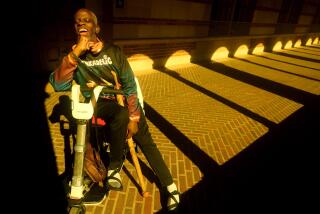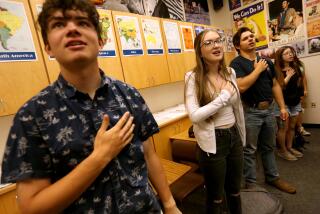IRVINE : Disabled Student’s Life Short but Full
- Share via
Thessaly Lynne Miles’ dream was to be typical--to go to a university, to live in a dormitory, to go to college dances.
Miles knew life in the dorms would be complicated because she had a muscle disorder, possibly muscular dystrophy. She needed the help of an attendant in the morning and the evening, used a wheelchair and had a breathing support system at night.
And when she died in her dorm room last week at age 18, she left a legacy of admirers who say they are inspired by her courage and her example.
The coroner’s office said the exact cause of death won’t be known for about 16 weeks. But a coroner’s official said it appears that Miles died of natural causes. She is survived by a brother, a sister and her parents.
“You get the feeling it’s not real. You expect to see her any time,” said Jaime Amezcua, 18, a biological sciences major who lived next door. “She loved school. It was just her dream to come to school, live in the dorm--live a normal life to the best possible extent.”
Miles’ father, John, a Newport Beach attorney, said that doctors were unable to stem the progress of an illness they could never fully diagnose, and Thessaly Miles and her family knew she could die at any time.
“The one thing she wanted more than anything was a life as normal as possible,” the Newport Beach attorney said. “She was trying to fly by herself, and we were trying to let her.”
As he gazed out the window of his fifth-floor office, Miles recalled how the illness slowly crept up on his daughter, from the first time she had to place her arm against the wall for support as a child to when she was too weak to climb the stairs of the school bus. It was almost as if she were carrying her body weight on her shoulders. If she were to stumble, her arms didn’t have the strength to break her fall, he said.
Eden Bright, who was Miles’ algebra teacher in junior high school and at Dana Hills High School, said Miles walked on her own until the exhaustion of moving around the high school campus forced her into a wheelchair.
She seemed so fragile that administrators were concerned about the job she held at school, working the switchboard. But Bright said Miles proved them wrong.
“It is tough,” Bright said of accepting Miles’ death. “Especially when (she’d) worked so hard and gone so far.”
Academically, she did well.
“I think she saw she could get past the wheelchair,” her father said. “You really don’t need a strong body, you need a strong mind.”
Her father said she refused to give up, refused to even think of herself as handicapped. She needed a wheelchair, but hated the idea of motorized vans with automatic lifts. She never wanted her parents to park in handicapped parking spots. She wanted to attend UC Irvine, even though a smaller campus would have been easier.
Miles said his daughter “really felt included” by the students at UC Irvine. Her roommate, for example, prodded her to attend the annual semi-formal dance.
She told her father that unlike other dances she had attended, she enjoyed this one. After her death, John Miles found flowers and a trophy glass among her things--party favors from the dance.
Her happiness with life at UCI prompted her father and some friends to discuss beginning a scholarship program in her honor for handicapped or disadvantaged students at UCI.
Preston Allen, the associate director for residential life in Middle Earth dorm complex, said he will remember Miles’ cheerfulness, which he attributed to “the fact that she had decided on something she wanted to do.”
“She enjoyed (life) while she had it,” he said. “I think we all wish that our lives were so complete.”
More to Read
Sign up for Essential California
The most important California stories and recommendations in your inbox every morning.
You may occasionally receive promotional content from the Los Angeles Times.













